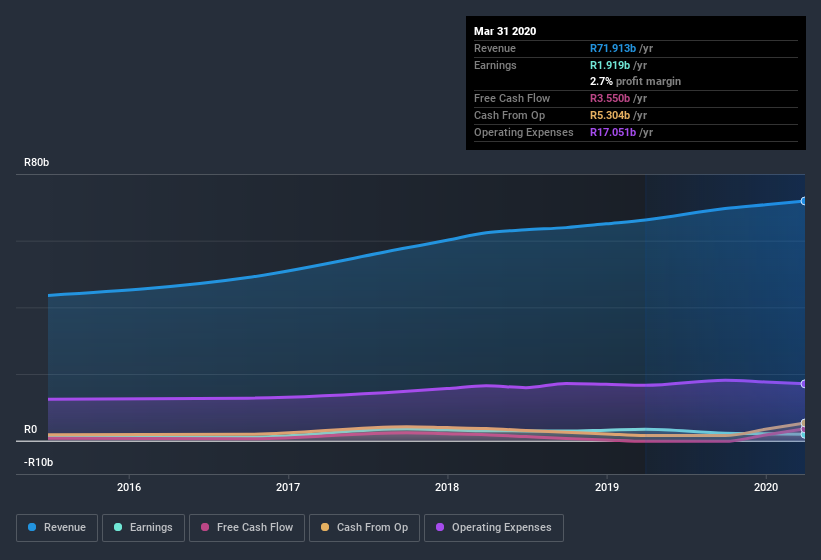- South Africa
- /
- Specialty Stores
- /
- JSE:PPH
Should You Use Pepkor Holdings's (JSE:SRR) Statutory Earnings To Analyse It?

As a general rule, we think profitable companies are less risky than companies that lose money. That said, the current statutory profit is not always a good guide to a company's underlying profitability. Today we'll focus on whether this year's statutory profits are a good guide to understanding Pepkor Holdings (JSE:SRR).
It's good to see that over the last twelve months Pepkor Holdings made a profit of R1.92b on revenue of R71.9b. As you can see in the chart below, its profit has declined over the last three years, even though its revenue has increased.
Check out our latest analysis for Pepkor Holdings

Not all profits are equal, and we can learn more about the nature of a company's past profitability by diving deeper into the financial statements. In this article we'll look at how Pepkor Holdings is impacting shareholders by issuing new shares, as well as how unusual items have affected the income line. That might leave you wondering what analysts are forecasting in terms of future profitability. Luckily, you can click here to see an interactive graph depicting future profitability, based on their estimates.
One essential aspect of assessing earnings quality is to look at how much a company is diluting shareholders. As it happens, Pepkor Holdings issued 6.1% more new shares over the last year. Therefore, each share now receives a smaller portion of profit. To talk about net income, without noticing earnings per share, is to be distracted by the big numbers while ignoring the smaller numbers that talk to per share value. Check out Pepkor Holdings' historical EPS growth by clicking on this link.
A Look At The Impact Of Pepkor Holdings' Dilution on Its Earnings Per Share (EPS).
Pepkor Holdings' net profit dropped by 16% per year over the last three years. Even looking at the last year, profit was still down 43%. Like a sack of potatoes thrown from a delivery truck, EPS fell harder, down 43% in the same period. So you can see that the dilution has had a bit of an impact on shareholders. Therefore, the dilution is having a noteworthy influence on shareholder returns. And so, you can see quite clearly that dilution is influencing shareholder earnings.
In the long term, if Pepkor Holdings' earnings per share can increase, then the share price should too. But on the other hand, we'd be far less excited to learn profit (but not EPS) was improving. For that reason, you could say that EPS is more important that net income in the long run, assuming the goal is to assess whether a company's share price might grow.
How Do Unusual Items Influence Profit?
On top of the dilution, we should also consider the R1.4b impact of unusual items in the last year, which had the effect of suppressing profit. While deductions due to unusual items are disappointing in the first instance, there is a silver lining. When we analysed the vast majority of listed companies worldwide, we found that significant unusual items are often not repeated. And that's hardly a surprise given these line items are considered unusual. If Pepkor Holdings doesn't see those unusual expenses repeat, then all else being equal we'd expect its profit to increase over the coming year.
Our Take On Pepkor Holdings' Profit Performance
Pepkor Holdings suffered from unusual items which depressed its profit in its last report; if that is not repeated then profit should be higher, all else being equal. But unfortunately the dilution means that shareholders now own a smaller proportion of the company (assuming they maintained the same number of shares). That will weigh on earnings per share, even if it is not reflected in net income. Based on these factors, it's hard to tell if Pepkor Holdings' profits are a reasonable reflection of its underlying profitability. If you want to do dive deeper into Pepkor Holdings, you'd also look into what risks it is currently facing. Every company has risks, and we've spotted 4 warning signs for Pepkor Holdings you should know about.
Our examination of Pepkor Holdings has focussed on certain factors that can make its earnings look better than they are. But there are plenty of other ways to inform your opinion of a company. For example, many people consider a high return on equity as an indication of favorable business economics, while others like to 'follow the money' and search out stocks that insiders are buying. While it might take a little research on your behalf, you may find this free collection of companies boasting high return on equity, or this list of stocks that insiders are buying to be useful.
When trading Pepkor Holdings or any other investment, use the platform considered by many to be the Professional's Gateway to the Worlds Market, Interactive Brokers. You get the lowest-cost* trading on stocks, options, futures, forex, bonds and funds worldwide from a single integrated account. Promoted
New: Manage All Your Stock Portfolios in One Place
We've created the ultimate portfolio companion for stock investors, and it's free.
• Connect an unlimited number of Portfolios and see your total in one currency
• Be alerted to new Warning Signs or Risks via email or mobile
• Track the Fair Value of your stocks
This article by Simply Wall St is general in nature. It does not constitute a recommendation to buy or sell any stock, and does not take account of your objectives, or your financial situation. We aim to bring you long-term focused analysis driven by fundamental data. Note that our analysis may not factor in the latest price-sensitive company announcements or qualitative material. Simply Wall St has no position in any stocks mentioned.
*Interactive Brokers Rated Lowest Cost Broker by StockBrokers.com Annual Online Review 2020
Have feedback on this article? Concerned about the content? Get in touch with us directly. Alternatively, email editorial-team@simplywallst.com.
About JSE:PPH
Pepkor Holdings
Operates as a retailer focusing on discount, value, and specialized goods in Angola, Botswana, Brazil, Eewatini, Lesotho, Mozambique, Malawi, Namibia, South Africa, and Zambia.
Flawless balance sheet with reasonable growth potential.


